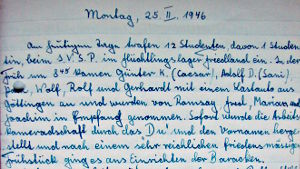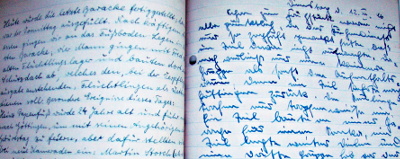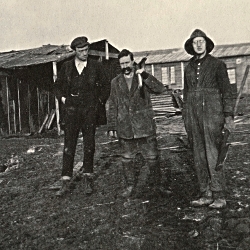Service Civil International
The Friedland 1946 Workcamp diary facsimile
by Heinz Gabthuler (Apr 12, 2016)
 The document I am presenting in this text is actually just a copy: I had donated the original to the recently opened Museum Friedland (www.museum-friedland.de) which is documenting the history of the transit camp for refugees and other migrants near the former border between West and East Germany. And when I visited the museum at its opening day, I was happy to see the SCI Archives’ donation having become part of its permanent exhibition.
The document I am presenting in this text is actually just a copy: I had donated the original to the recently opened Museum Friedland (www.museum-friedland.de) which is documenting the history of the transit camp for refugees and other migrants near the former border between West and East Germany. And when I visited the museum at its opening day, I was happy to see the SCI Archives’ donation having become part of its permanent exhibition.
From Feb 25 until March 24, 1946, a group of mostly male German students from the nearby University of Göttingen had been working together with British conscientious objectors from IVSP – which later became the British branch of SCI - doing construction work in the transit camp that had been opened already in 1945 for temporarily hosting former German prisoners of war and expellees from territories that later became part of Poland or Russia. Even though German volunteers had already participated in the very first service of what later became SCI in Esnes near Verdun in 1920 / 21, this was the first workcamp taking place in Germany with participation of German volunteers – almost exactly 70 years ago.
Each day during these four weeks, one of the participates wrote one, two or three pages into an empty notebook which became the “Tagebuch des Studenteneinsatzes beim I.V.S.P. im Flüchtlingslager Friedland†(“Diary of the student service with IVSP in the refugee camp Friedlandâ€). Most of the texts are in German, some even in the old-fashioned German handwriting I am not able to decode. Probably most of the German students of this epoch were not able to express themselves sufficiently in English, as in fascist Germany foreign languages had not been given high priority in schoolteaching. It is even more likely that at least some of the British participants were able to communicate in German – quite the contrary to nowadays! One of them (the British-style handwriting suggests this) wrote the notes on Friday March 15 – half in German, half in English. But they learned quickly, at least some basics of English savoir-vivre: On Sunday, March 10, “we are having a ‘high meal’ at 1 p.m., completely the English way. We are having roast-beaf [sic!] with raw white cabbage, accompanied by Yorkshire pudding. This is a pancake dough baked with lots of fat in the oven. Ramsay [the leader of the IVSP group] is preparing it like an expert. As an ‘after’ [English in original], there is apple-pie with coffee.†Later on, the whole group gets “complete hightea†[sic!], before they all went to Göttingen to attend a Mozart concert or opera performance in the theatre. But apart from getting to know the pleasures of English cuisine, the group is also eager to discuss “long, democratically and in an exhaustive way†the practicalities of the service, as well as listening to Ramsay explaining “aims, work, ideas and organisation of IVSP†(Friday, March 1st).

According to Bertram Schröter, the unofficial “historian†of the German SCI branch, most of the male German volunteers had been officers in Hitler’s Wehrmacht. Less than one year ago, Germany had capitulated. And now, they are voluntarily working with the former “enemy†– whereas the IVSP people were pacifists, the whole project took place under supervision of the British military government in Germany. And the German participants were learning how to discuss practical matters in a democratic way together with their British colleagues – even if the discussions sometimes did not lead to consensus.
In October 1946, the German branch of SCI was founded in Hannover, not far from Friedland, with the approval of the British authorities. One of the strongest and most stable SCI branches will thus celebrate 70 years of existence towards the end of 2016 – with this year’s ICM taking place in Germany. And Friedland, apart from hosting a brand new museum, is still a transit camp for refugees. Today their origin is places like Syria, Afghanistan, and Eritrea.
Heinz Gabathuler, International Archives Coordinator
Â
In the SCI International Archives, the facsimile of the Friedland diary has been given the number 20461.4. Pictures of this first “real work camp†in Germany can be found on the Archives here. Furthermore, Bertram had taken the enormous effort to type down the whole diary and make it available for those who do understand German: Friedland work camp diary



